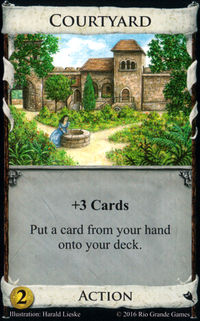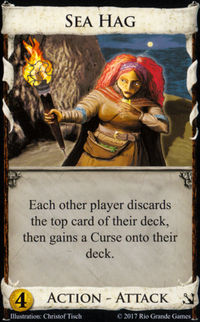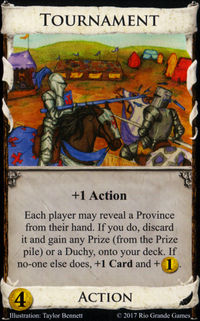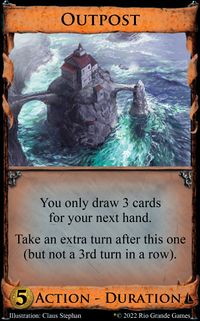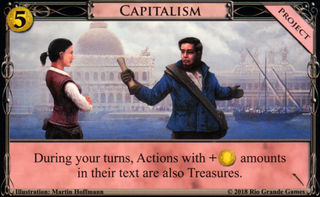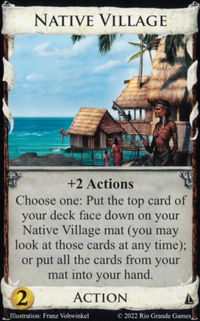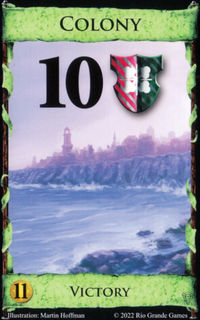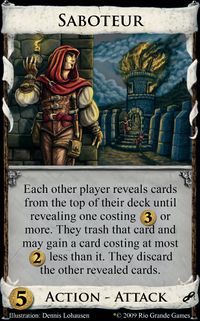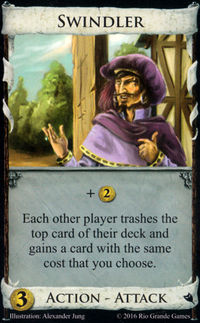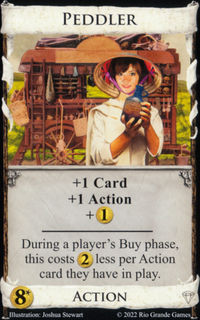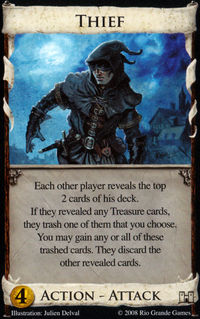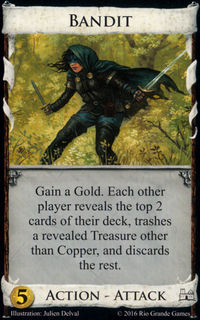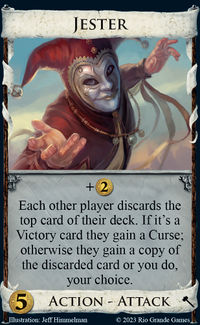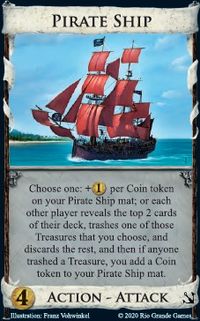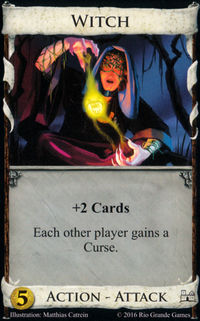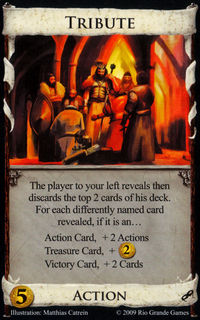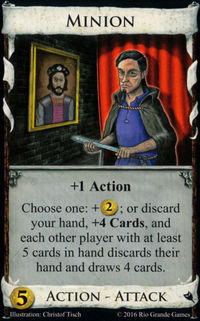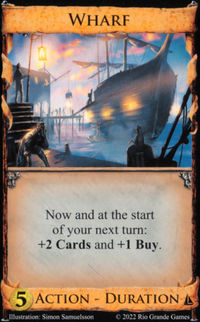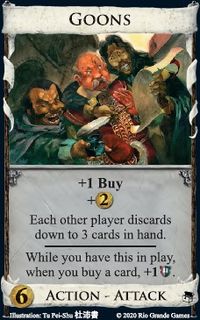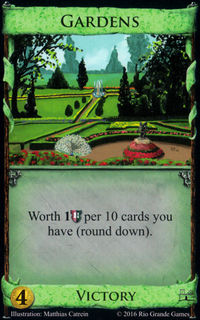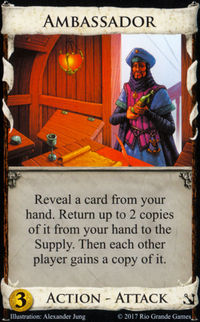User talk:Spineflu
The Fan card Creation Guide is an extensive collection of tips and guidelines for fan created cards written by user rinkworks; Aquila later wrote an expansion/updated companion piece to it. The guide is well respected and often referenced in the design and critique of fan made cards.
The rinkworks guide is reproduced here in its entirety, with edits for clarity, formatting, and omitting outdated (first edition) information, with additional content from Aquila and users credited on the edit history of this page.
Introduction
Way, Way TLDR: Playtest your fan cards.
The first rule about creating custom fan cards for Dominion is that you can ignore every single rule about it if you want to. Dominion is a game. Its purpose is fun. If you've got a card idea that sounds fun, do it. Playtest it. If it remains fun after scrutiny, keep playing with it.
Donald X. Vaccarino, the creator of Dominion, on house rules and variants: "I encourage people to play whatever game variants they want, provided they comply with local laws and are agreed upon by all players."
However, this guide might help you create balanced cards without falling into as many pitfalls along the way. If you get past all those, you might still have trouble figuring out how to cost your cards. This guide might help you there, too. Additionally, the later sections of the guide discuss issues related to creating artwork for your cards, printing them, and using them.
Dominion is a very simple, highly flexible game model, and it's very easy to add to. With that flexibility, though, is the potential to make uninteresting ideas. Whilst they may not be flawed, your ideas could get to be disappointing in some way after playing with them for a while. Particularly disappointing if you went through the trouble of getting them printed out. This guide aims to help make your good ideas into great ones before the final send-off to print, big reveal to your friends, etc.; it goes through the design process, identifying where people can take a bad turn, aiming to help refine your card ideas to be just what you want them to be. Whether a single card or a whole bunch of them, or your own expansion, this is going to help.
This guide may look like a rather serious, studious look into the field of Dominion design, but I'm well aware this isn't the most important thing in life and I'm not pretending to be a second Donald X. I just settled into playing and learning the game, the idea of making custom cards came up some day, and I fell in love with the thought instantly. I like designing, and Dominion is a simple yet diverse game that is amazingly expandable. This guide is the product of about 2½ years casually exploring the field, written through personal interest and seeing how the forum is continually active.
Some quick notes on courtesy:
- If you're going into fan card creation with the goal of showing Donald X your cards so he can tell you how good they are and that they'll be in the next dominion expansion, don't. With the exception of Courtyard, DXV dislikes card submissions, avoids the Variants & Fan Cards subforum, and gets upset when they're posted in the endless interview thread. Don't be a jerk to the only person who can get Dominion cards printed legally.
- If you're going into fan card creation with the goal of expanding your board game geek resume, don't. That's thin ice, legally speaking.
- If you're going into fan card creation with the goal of adding all your cards to wiki.dominionstrategy (this site), don't. That's not what the wiki is for.
Glossary
General Tips
- Be open minded. When you get an immediate good feeling for an idea, note it down straight away. Know the rules and makeup of Dominion well (but you don't have to be a top pro player). Refer to the Research section for help.
- You will want to break away from your projects occasionally. Don't try to battle through if you're on a time constraint - the end results will not be of the best quality - rather factor them in to your schedule. Keep clear notes so you know what you're doing when you come back.
- To make a design fun to play long term, focus on the mechanics first, then its theme. The more open it is to interactions, whilst having a definite primary function so it can't do everything, the more replayable it will be and hence interesting long term.
- Design briefs for individual cards should specify something relating to one or more of its properties or needed mechanics, and be understandable to another person.
- Each card you make should be on the same power level as the official ones and a fun or interesting play experience.
- Before doing any playtesting, imagine your ideas in the game as you create them. See how one change or addition affects every other aspect of it. Running a few solo tests may help.
- You should be able to sum up what your ideas do in one quick sentence.
- For testing simplicity, get another player to explain what your ideas do.
- Upvotes on the dominion strategy forum show a good first impression, not necessarily a good overall design.
So now let's follow the order of the design process and apply it to Dominion. No matter how you make your ideas, with paper notes or mental ones, casually or organised, you're going through the same process to get to your final outcome. Even if you have ideas down already, it's still beneficial to backstep and look at the basics, in case you struggle to refine or add to your ideas. If an idea you have turns out bad at some point, it isn't necessarily a lost cause; you can step back and tweak things to try and save it.
Know Your Canon
Be intimately familiar with all of the official Dominion cards and how to make the best use of them. You don't have to be an expert Dominion player, but you should be an expert at knowing what each card does and when and why you'd want to use it. Okay, so you don't technically have to know ALL the cards, but my point is that there are more design principles behind the published cards than you might think at first glance.
For example, do you know why Sea Hag discards the top card of your deck instead of just having you plunk the Curse on top? (Answer: So multiple Sea Hags don't completely destroy your next turn.) Do you know why Tournament gives +1 Action? (Answer: So a player with a Tournament in hand but no Province doesn't have to agonize over the uninteresting decision to risk playing Tournament at the expense of another terminal Action in his hand.) Do you know why Outpost won't let you take more than two turns in a row? (Answer: Otherwise you could build a deck that plays an Outpost every turn, shutting out all other players.)
Knowing why the official cards are the way they are will keep you out of the same traps they avoid.
Beyond the Canon
The Secret Histories and Endless Interview both have extremely valuable insights into what has and hasn't worked with official DXV playtesting.
The Variants and Fan Cards subforum - especially the Weekly Design Contest thread - can be a treasure trove of useful jumping off points and ideas that both work and don't work; a caveat with these is the date they were posted compared to which sets were available as "official" reference at the time - several things that used to be a semi-viable card were suddenly made overpowered in games with Capitalism, or an official card did them better.
Keep It Simple
Simplicity is a good thing. You don't want your cards to be any more complicated than they have to be. If you have an idea for a card, try to boil it down as simply as possible without losing the essence of the idea. Note, by the way, that by "simplicity," I'm talking about the concepts you use, not necessarily how complex and careful the the card text has to be to convey those concepts. Native Village for example, has a wall of text on it, but that's okay since the concept itself is a simple one. Once players learn what it does, they don't have to reread the card text every time just to make sure each use conforms to every nuance.
Swing is a Miss
Try to recognize cards that will be "swingy" and avoid them, unless adding swinginess to the game is your intention. By "swingy," I mean a card that will tip the balance of the game too much, especially in a random way. In general, you want to reward good strategy, not random luck.
As an example, suppose you had an attack card that allowed you to take the top card of the deck of the player to your left. You might get lucky and turn up a Colony, resulting in a 20-point swing in your favor — more than the margin of victory for many if not most Dominion games. Or you might get very unlucky and turn up a Curse, resulting in a 2-point swing against you. With such a card, strategic play scarcely matters. The winner is whoever gets luckier with that attack.
Swinginess does exist in the official Dominion cards but on a dramatically smaller scale. Saboteur turning a Colony into a Province is only a 4-point swing. Swindler turning a Province into a Peddler is a defensible edge case. Thief and Bandit only work on treasure: a plentiful, non-scoring resource. Also note that many of those swingy cards have been removed as of the Second Edition.
Scale Model
Make sure your card scales well to multiple players. It's okay if a card plays differently with different numbers of players — many of the official cards do, like Jester and Pirate Ship —but you don't want a card that only works with a certain number and is brokenly weak or brokenly strong otherwise. Note that it is no accident that Witch affects all opponents, while Tribute only affects one. The other way around, and neither Witch nor Tribute would scale properly with different numbers of players.
Avoid Scripted Play
Try to avoid cards that encourage uninteresting strategies. You probably don't want to disincentivize creative or otherwise interesting play. As a trivial example, let's say you had a Duration card that prohibited other players from playing action cards while it's in play. This would cause all your opponents' Action cards to be dead cards. How would they defend against this? By not buying action cards and pursuing a money strategy instead. That, in turn, would discourage you from using your new Duration card in the first place, and the game would degenerate into a simple race for money.
You can't anticipate everything, but if you spend a little time to think about the impact your custom cards will have, you can save yourself a lot of playtesting time.
Fair isn't Balanced
Just because a card is "fair" doesn't make it "balanced." A card is "fair" if all players have equal opportunity to obtain the card and reap the same benefits from playing it. Fairness is good. But just because a card is fair doesn't make it balanced.
Imagine a Treasure/Victory card that costs , is worth , and counts 100 ![]() at the end of the game. It's fair, as all players have equal opportunities to obtain it. But the optimal strategy, dramatically excluding all others, is to buy only those until the pile is gone. And then it doesn't matter what you do, because the loser of that race can't hope to make up the VP deficit with mere Provinces. The card is, while fair, grotesquely unbalanced.
at the end of the game. It's fair, as all players have equal opportunities to obtain it. But the optimal strategy, dramatically excluding all others, is to buy only those until the pile is gone. And then it doesn't matter what you do, because the loser of that race can't hope to make up the VP deficit with mere Provinces. The card is, while fair, grotesquely unbalanced.
Balance problems with fan cards are unfortunately going to be more subtle than this. Usually it's going to be a judgment call. If Minion, Saboteur, Wharf, and Goons had been fan cards, I'm pretty sure the reaction from experienced Dominion players would be to decry them as unbalanced. They do walk the edge. But the point is that balance isn't an objective yes or no but a judgment call: if they greatly shape the games they're in (as is also the case with Gardens, Witch, Ambassador, Chapel and others), does that influence make the game more or less fun?
At the other extreme, as Donald X. has said, if you have a card that doesn't change the game at all, what's the point?
